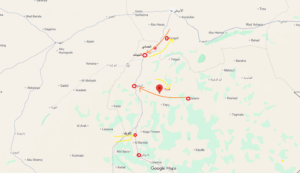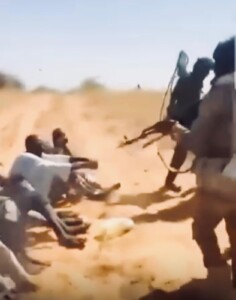More human rights abuses in Sudan despite lifting of State of Emergency
Two protesters complained about being abused in detention after they were held during a vigil for the young activists who are on trial after being accused of killing a police officer. Security forces also used heavy tear gas on protesters during yesterday’s pro-democracy protests despite the lifting of the State of Emergency on Sunday. The UN Expert on Human Rights in Sudan will arrive in Khartoum tomorrow, for an offiial visit to the country.
 Signs of the two accused protesters at a solidarity vigil (social media)
Signs of the two accused protesters at a solidarity vigil (social media)
Two protesters complained about being abused in detention after they were held during a vigil for the young activists who are on trial after being accused of killing a police officer. Security forces also used heavy tear gas on protesters during yesterday’s pro-democracy protests despite the lifting of the State of Emergency on Sunday. The UN Expert on Human Rights in Sudan will arrive in Khartoum tomorrow, for an offiial visit to the country.
The Sudanese Emergency Lawyers reported on Monday that two participants of a protest have been abused by security forces. The vigil was held on Sunday for the trial session of trial of Mohamed Adam (17), nicknamed ‘Tupac', and Mohamed El Fateh (18), nicknamed 'El Nana', and Musab El Shareef, who were accused of killing a police officer during anti-junta protests in January.
The authorities detained four people, including a young woman, during the vigil in front of the Judicial Sciences Institute in Arkaweet in eastern Khartoum on Sunday, before they were released on bail the following day. Two of them complained about being abused in detention.
Lawyer Amira Mohamed, one of the Emergency Lawyers, told Radio Dabanga that the lawyers are in the process of compiling a Form 8 for the victims, in preparation for filing official complaints about torture.
In Sudan, medical evidence of an assault is admitted solely via the so-called Form 8. It can be issued only by police stations, hospitals, or clinics. Critics state that the form is “glaringly inadequate”, as sufficient medical evidence is often very difficult to obtain.
The trial
The controversial trial comes after a long period in which the accused faced torture and abuse in prison and went on hunger strike, sparking outcries from human rights organisations to release the two.
In a statement published on February 28, Amnesty International wrote that "there are credible concerns the youths were abducted and held without charge, in violation of their due process rights, and subjected to torture while in detention".
In January, lawyer Eman Hasan told Radio Dabanga that the two detainees were questioned about the sources of funding behind the protests and about members of resistance committees, but not about the police brigadier they were accused of stabbing.
The authorities hold them responsible for the killing of Brig Bereima during the protests. Various Sudanese, however, reported on social media that Brig Ali Bereima was killed a week before. Others tweeted that the police officer was killed in the early morning of January 13, while the demonstrations started much later that day.
Violent repression despite State of Emergency lifting
Various neighbourhoods in Khartoum and Omdurman witnessed protest marches and road closures yesterday to demand full civilian rule.
Security forces fired tear gas heavily at pro-democracy demonstrations at the El Arbaeen street (renamed Martyr Abdelazeem street) in Omdurman, which led to injuries and cases of respiratory problems.
The security forces’ violent repression of the protest is taking place despite Sunday’s decision of the President of the Sovereignty Council, Lt Gen Abdelfattah El Burhan, to lift the State of Emergency to prepare for a nationwide dialogue.
The State of Emergency allowed coup authorities to round up and detain hundreds of activists since the beginning of the coup.
The end of the State of Emergency was called for by many international parties and human rights organisations.
Human Rights Expert visit
The United Nations (UN) Expert on Human Rights in Sudan, Adama Dieng, will begin an official visit to Sudan tomorrow, on Wednesday.
During his visit, which will end on June 4, Dieng is scheduled to meet with senior government officials, representatives of civil society organisations, human rights defenders, heads of UN agencies, and diplomats.
Dieng will continue his communication with the Sudanese authorities and follow up on the measures taken by the authorities to address the recommendations he made following his first visit, which took place in February this year.
After his visit in February, Dieng already called for the State of Emergency to be abolished and to stop the use of live ammunition against the demonstrators.
The results of this follow-up visit are set to contribute to the enhanced interactive dialogue on Sudan that will take place on 15 June 2022 during the fiftieth session of the Human Rights Council.
Dieng will also hold a press conference on June 4 at the UN Office of the High Commissioner for Human Rights (OHCHR) premises in Khartoum, starting at 10am local time.











 and then
and then